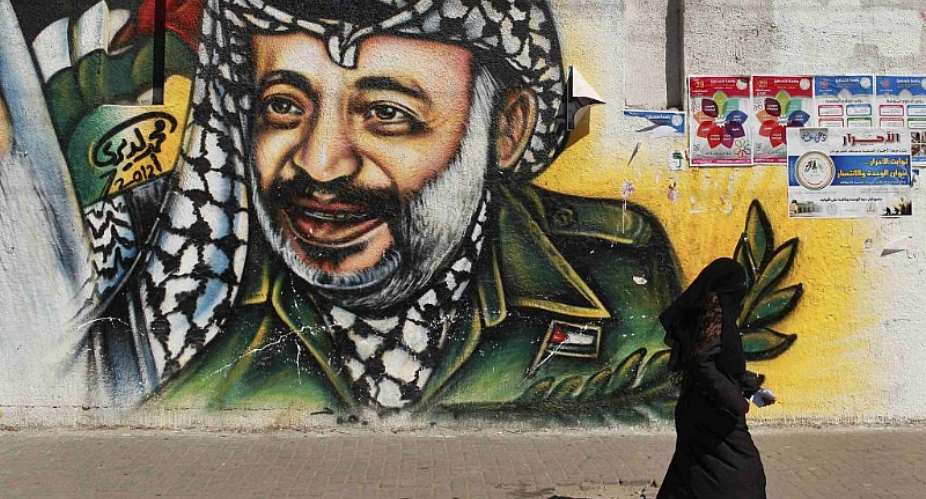Thousands of Palestinians marked the 15th anniversary of the death of Yasser Arafat in the occupied West Bank on Monday. One man was reportedly killed in clashes with the Israeli forces.
On November 11, 2004, Mohammed Abdel Rahman Abdel Raouf Arafat al-Qudwa al-Husseini, the man who embodied the Palestinian struggle for statehood for over 40 years, died in a hospital near Paris from a massive hemorrhagic stroke as per the released medical report.
His personal doctor Ashraf al-Kurdi and aide Bassam Abu Sharif both believed his death to be the cause of poisoning likely by Israel.
But Israeli continue to deny such claims.
Legacy of Arafat
Most people remember the iconic image of Arafat: a lightly bearded man wearing his keffiyeh scarf - the checkered black and white pattern that has become a symbol of Palestinian nationalism – dressed in a safari suit.
He was the man who represented the struggle of Palestinians for statehood through the PLO, the Palestine Liberation Organisation founded in 1964.
Arafat joined the PLO in 1967 and by 1969 was its elected leader until his death in 2004.
At the time, the PLO was founded with the purpose of liberating Palestine through armed struggle.
For that reason, the PLO was considered by both the United States and Israel to be a terrorist organization.
A major mark of Arafat's legacy came out of the 1991 Madrid Conference and the 1993 Oslo Accords when the PLO recognized Israel's right to exist in peace and rejected “violence and terrorism”.
This culminated in the signing of the accords between 1993 and 1995 by the PLO, headed by Arafat, which led to the establishment of the Palestinian Authority, the PA: a temporary self-governing body.
The accords also meant new conditions for the Palestinians to accept, such as giving-up more than 60 percent of the West Bank under Israeli control and security coordination between Israel and the PA.
But what the accords never brought to the Palestinian people was the establishment of a state, which is why the legacy left by Arafat, culminating in these accords and a Nobel Peace Prize, is often believed to have been the death of the Palestinian struggle for freedom.
Poisoning polemic
His mixed legacy was still met by a sense of loss following the announcement of his death in 2004.
Rumours of a possible poisoning lead to his body being exhumed in 2012 so separate teams of French, Swiss and Russian investigators could collect samples to investigate them independently.
His widow, Suha Arafat, had called for the autopsy in the wake of findings from a Swiss laboratory that had reported polonium levels up to 18 times higher than expected.
But the Swiss lab's findings could not conclude that he was poisoned when he fell ill at his West Bank compound, but just simply an unexplained level of polonium.
French investigators later concluded in 2013 that his death was due to “old age following a generalized infection”.
Marking his anniversary
15 years on, Arafat's death is being celebrated on Monday across Gaza and the West Bank as thousands took to the streets in his honour.
Clashes erupted between Palestinians and Israeli forces during the demonstrations, leaving one Palestinian dead in the Hebron area AFP has reported.
Mahmud Abbas, the Palestinian president following Arafat's death, laid a wreath at his tomb during a ceremony in Ramallah where hundreds gathered with pictures and flags.





 There’s nothing you can do for us; just give us electricity to save our collapsi...
There’s nothing you can do for us; just give us electricity to save our collapsi...
 Ghanaian media failing in watchdog duties — Sulemana Braimah
Ghanaian media failing in watchdog duties — Sulemana Braimah
 On any scale, Mahama can't match Bawumia — NPP Youth Organiser
On any scale, Mahama can't match Bawumia — NPP Youth Organiser
 Never tag me as an NPP pastor; I'm 'pained' the 'Akyem Mafia' are still in charg...
Never tag me as an NPP pastor; I'm 'pained' the 'Akyem Mafia' are still in charg...
 Your refusal to dedicate a project to Atta Mills means you never loved him — Kok...
Your refusal to dedicate a project to Atta Mills means you never loved him — Kok...
 2024 elections: I'm competent, not just a dreamer; vote for me — Alan
2024 elections: I'm competent, not just a dreamer; vote for me — Alan
 2024 elections: Forget NPP, NDC; I've the Holy Spirit backing me and nothing wil...
2024 elections: Forget NPP, NDC; I've the Holy Spirit backing me and nothing wil...
 2024 elections: We've no trust in judiciary; we'll ensure ballots are well secur...
2024 elections: We've no trust in judiciary; we'll ensure ballots are well secur...
 Performance tracker: Fire MCEs, DCEs who document Mahama's projects; they're not...
Performance tracker: Fire MCEs, DCEs who document Mahama's projects; they're not...
 Train crash: Railway ministry shares footage of incident
Train crash: Railway ministry shares footage of incident
